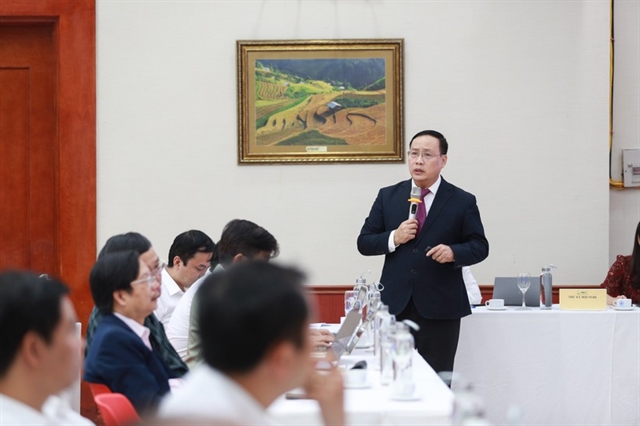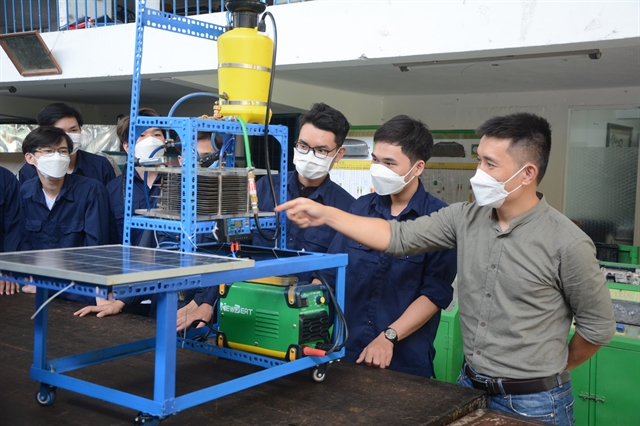.jfif) Opinion
Opinion

Giáo dục & Thời đại (Education & Times) newspaper spoke to Dr Sci Nguyễn Đình Đức, director of the Academic Affairs Department at Vietnam National University - Hanoi about the efforts of Việt Nam's higher education sector to transform and make breakthroughs at international levels.

|
| Professor Dr Sci Nguyễn Đình Đức (right). — Photo giaoducthoidai.vn |
Giáo dục & Thời đại (Education & Times) newspaper spoke to Dr Sci Nguyễn Đình Đức, director of the Academic Affairs Department at Vietnam National University - Hà Nội about the efforts of Việt Nam's higher education sector to transform and make breakthroughs at international levels.
Higher education plays a key role in training skilled, high-quality human resources for the country. What challenges is Việt Nam facing?
First and foremost, it is about quality. Education, including higher studies, must always see quality as the most crucial factor, in which personnel quality is the most important element. Therefore, the challenge for Việt Nam’s higher education institutions is to focus on and pay special attention to building their personnel capacity and developing the potential for science and technology.
We also need to accelerate and further strengthen the quality control progress for training programmes, as well as the integration process regarding international standards and qualifications. To have resources for development, in 2023, higher education institutions need to soon complete the economic and technical criteria for all of their programmes, while also speeding up the process for autonomy.
In addition, the 2012 Law on Higher Education, which is amended in late 2018, has multiple positive and breakthrough changes, however, the actual implementation process has revealed several shortcomings (such as the model and role of the school council in public universities).
We must also look into the thinking and logic of universities - higher education schools, of which the leading role of two national universities and research universities bear great meaning. Today, the quality control of training programmes is the sole basis to determine tuition fees, and therefore this needs to be further improved and revised in the future.
What should development models and trends of universities be in the future?
Alongside training, the development models and trends of a university in the Industry 4.0 era will have three key pillars: research (to master science and knowledge), innovation and digital transformation.
These are the key directions that higher education institutions can follow to define their development strategies in international integration, and in the powerful fourth industrial revolution of today.
Do you think that universities can utilise their strengths and bring about new changes, resources and destinations for ambitious and talented scientists as expected?
University autonomy and the open and innovative policies of our Party and State in recent years, as well as the strong integration regarding international standards and qualifications in higher education, are the new changes and the basis on which there will be new resources for development.
Since the process for university autonomy begins, these institutions have been rapidly attracting local and international resources for growth. Those that are quicker to be autonomous enjoy more favourable conditions to draw talented scientists at home and abroad to come and work there. From that point, they become stronger and better contribute to the science-technology potential of the country.
With good benefits and working environments in research, several major and reputable universities in Việt Nam such as the two national universities, Hanoi University of Science and Technology, among others, have become reliable destinations that attract talented scientists from across the country and abroad.

|
| A mechanics lesson at the University of Technology and Education (under the University of Danang). — VNA/VNS Photo Văn Dũng |
In 2023, do you hope that Việt Nam’s higher education sector will continue seeing breakthrough progress in terms of quality and innovation demands?
In recent years, Việt Nam’s higher education has always seen rapid and powerful development on a yearly basis in multiple aspects.
For example, according to a 2022 publication in the US journal PLoS Biology, there are 34 scientists in Việt Nam among the 100,000 top-cited scientists in the world. Reviewing the annual data, we see that there are six more people in 2022 compared to the previous year, and six more in 2021 compared to 2020.
In 2021, the Vietnam National University - Hanoi (VNU-Hanoi) had only five subjects in the top 500 of the QS world ranking. In 2022, this figure increased to six. Mathematics and physics rose from Group 500 to 400 in the same year. And for the first time, in 2022, its engineering was placed 386th globally.
At this rate, I hope and strongly believe that Vietnamese higher education will see breakthrough development in 2023 and the years to come.
For higher education to further contribute to the country’s socio-economic development and international integration, what are the adjustments that should be made from the management level?
The higher education sector provides training from undergraduate to doctoral and post-doctoral levels. Universities are the places that train the elite and high-quality human resources for the country.
According to statistics from the Ministry of Education and Training, the number of international ISI/Scopus publications of Việt Nam is 17,625, of which those from universities account for 90 per cent.
From the experience of Japan, South Korea, China and India, it is evident that education and training, human resources quality and science-technology potential is the key to seizing opportunities and making breakthroughs.
For the sector of higher studies to continue growing according to the expectations of the Party, the State and the people, responding to the demands to build and protect the country in the Industry 4.0 era, I believe that the management levels should focus on several key points in the future.
They need to further accelerate and perfect the university autonomy model, alongside reviewing the conditions to ensure the quality of training programmes. Failing to implement the model for university autonomy will lead to a lack of motivation and resources for the development of these institutions.
It is also necessary to speed up the implementation of the project to internationalise Vietnamese higher education, and standardise training programmes according to the regional and global competency framework.
Each higher education institution needs to actively review its governance, accelerate digital transformation and digitise the management processes in the school, while also applying new and advanced pedagogical technology in operations.
And finally, as I have analysed, it is still a must to study and continue adjusting the Law on Higher Education. With such key solutions, if done well, I believe that in the future there will be breakthrough growth in Việt Nam’s higher education system. — VNS




